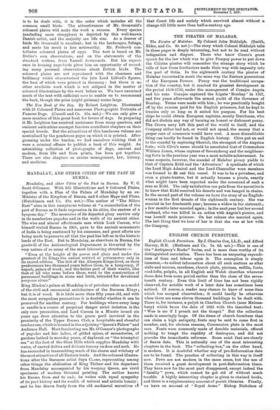THE PIRATES OF MALABAR.
The Pirates of Malabar. By Colonel John Biddulph. (Smith, Elder, and Co. 6s. net.)—The story which Colonel Biddulph tells in these pages is deeply interesting, but not to be read without indignation and disgust. Those who know Cicero's great speech for the law which was to give Pompey power to put down the Cilician pirates will remember the strange story which he tells of how these freebooters made their way with impunity into the port of Ostia. In the eighteenth century the pirates of Malabar terrorised in much the same way the Eastern possessions of the European Powers. Piracy was the traditional occupa- tion of the country, but it reached its greatest development in the period 1638-1756, under tho management of Conajee Angria and his sons. Conajee captured the frigate `Bombay' in 1707, and five years afterwards the armed yacht of the Governor of Bombay. Terms were made with him ; he was practically bought off by the ransom paid for his English prisoners, but he kept to treaties only so long as it suited his purpose. For his best ships he could obtain European captains, mostly Dutchmen, who did not disdain any way of turning an honest or dishonest penny. The Crown navy left this part of the world to itself, and the Company either had not, or would not spend, the money that a proper care of commerce would have cost. A more discreditable thing can hardly be found in English history. Clive put an end to the scandal by capturing Gheriah, the strongest of the Angrian forts; with Clive's name should be associated that of Commodore William James, whose capture of Severndroog and the neighbour- ing forts in the previous year was a most notable achievement. In some respects, however, the scandal of Malabar piracy yields to that of Captain Kidd and the 'Adventure.' A syndicate of which the Lord High Admiral and the Lord Chancellor were members was fornied to fit out this vessel. It was to be a privateer, and even a pirate-hunter, but it actually became a pirate, exactly what might have been expected under the command of such a man as Kidd. The only satisfaction one gets from the narrative is to know that Kidd received his deserts and was hanged in chains. In the second part of the volume we have the story of an English- woman in the first decade of the eighteenth century. She was married in her fourteenth year; became a widow in her sixteenth ; a few months later married again; in the next year lost her second husband, who was killed in an action with Angria's pirates, and was herself made prisoner. On her release she married again. The last thing that we hear of her is that she was at law with the Company.










































































 Previous page
Previous page